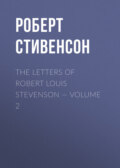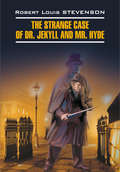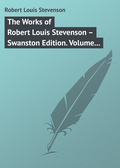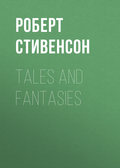
Роберт Льюис Стивенсон
The Works of Robert Louis Stevenson – Swanston Edition. Volume 23
To Mrs. Sitwell
The history of the scruples and ideas of duty in regard to money expressed in the following letter is set forth and further explained in retrospect in the fragment called Lay Morals, written in 1879. The Walt Whitman essay here mentioned is not that afterwards printed in Men and Books, but an earlier and more enthusiastic version. Mr. Dowson (of whom Stevenson lost sight after these Riviera days) was the father of the unfortunate poet Ernest Dowson. His acquaintance was the first result of Stevenson’s search for “anyone conversable” in the hotel.
Menton, Sunday [November 30, 1873].
MY DEAR FRIEND, – To-day is as hot as it has been in the sun; and as I was a little tired and seedy, I went down and just drank in sunshine. A strong wind has risen out of the west; the great big dead leaves from the roadside planes scuttled about and chased one another over the gravel round me with a noise like little waves under the keel of a boat, and jumped up sometimes on to my lap and into my face. I lay down on my back at last, and looked up into the sky. The white corner of the hotel, with a wide projection at the top, stood out in dazzling relief; and there was nothing else, save a few of the plane leaves that had got up wonderfully high and turned and eddied and flew here and there like little pieces of gold leaf, to break the extraordinary sea of blue. It was bluer than anything in the world here; wonderfully blue, and looking deeply peaceful, although in truth there was a high wind blowing.
I am concerned about the plane leaves. Hitherto it has always been a great feature to see these trees standing up head and shoulders and chest – head and body, in fact – above the wonderful blue-grey-greens of the olives, in one glory of red gold. Much more of this wind, and the gold, I fear, will be all spent.
9.20. – I must write you another little word. I have found here a new friend, to whom I grow daily more devoted – George Sand. I go on from one novel to another and think the last I have read the most sympathetic and friendly in tone, until I have read another. It is a life in dreamland. Have you read Mademoiselle Merquem?
Monday.– I did not quite know last night what to say to you about Mlle. Merquem. If you want to be unpleasantly moved, read it.
I am gloomy and out of spirits to-night in consequence of a ridiculous scene at the table d’hôte, where a parson whom I rather liked took offence at something I said and we had almost a quarrel. It was mopped up and stifled, like spilt wine with a napkin; but it leaves an unpleasant impression.
I have again ceased all work, because I felt that it strained my head a little, and so I have resumed the tedious task of waiting with folded hands for better days. But thanks to George Sand and the sunshine, I am very jolly.
That last word was so much out of key that I could sit no longer, and went away to seek out my clergyman and apologise to him. He was gone to bed. I don’t know what makes me take this so much to heart. I suppose it’s nerves or pride or something; but I am unhappy about it. I am going to drown my sorrows in Consuelo and burn some incense in my pipe to the god of Contentment and Forgetfulness.
I do not know, but I hope, if I can only get better, I shall be a help to you soon in every way and no more a trouble and burthen. All my difficulties about life have so cleared away; the scales have fallen from my eyes, and the broad road of my duty lies out straight before me without cross or hindrance. I have given up all hope, all fancy rather, of making literature my hold: I see that I have not capacity enough. My life shall be, if I can make it, my only business. I am desirous to practise now, rather than to preach, for I know that I should ever preach badly, and men can more easily forgive faulty practice than dull sermons. If Colvin does not think that I shall be able to support myself soon by literature, I shall give it up and go (horrible as the thought is to me) into an office of some sort: the first and main question is, that I must live by my own hands; after that come the others.
You will not regard me as a madman, I am sure. It is a very rational aberration at least to try to put your beliefs into practice. Strangely enough, it has taken me a long time to see this distinctly with regard to my whole creed; but I have seen it at last, praised be my sickness and my leisure! I have seen it at last; the sun of my duty has risen; I have enlisted for the first time, and after long coquetting with the shilling, under the banner of the Holy Ghost!10
8.15. – If you had seen the moon last night! It was like transfigured sunshine; as clear and mellow, only showing everything in a new wonderful significance. The shadows of the leaves on the road were so strangely black that Dowson and I had difficulty in believing that they were not solid, or at least pools of dark mire. And the hills and the trees, and the white Italian houses with lit windows! O! nothing could bring home to you the keenness and the reality and the wonderful Unheimlichkeit of all these. When the moon rises every night over the Italian coast, it makes a long path over the sea as yellow as gold.
How I happened to be out in the moonlight yesterday, was that Dowson and I spent the evening with an odd man called Bates, who played Italian music to us with great feeling; all which was quite a dissipation in my still existence.
Friday.– I cannot endure to be dependent much longer, it stops my mouth. Something I must find shortly. I mean when I am able for anything. However I am much better already; and have been writing not altogether my worst although not very well. Walt Whitman is stopped. I have bemired it so atrociously by working at it when I was out of humour that I must let the colour dry; and alas! what I have been doing in its place doesn’t seem to promise any money. However it is all practice and it interests myself extremely. I have now received £80, some £55 of which still remain; all this is more debt to civilisation and my fellowmen. When shall I be able to pay it back? You do not know how much this money question begins to take more and more importance in my eyes every day. It is an old phrase of mine that money is the atmosphere of civilised life, and I do hate to take the breath out of other people’s nostrils. I live here at the rate of more than £3 a week and I do nothing for it. If I didn’t hope to get well and do good work yet and more than repay my debts to the world, I should consider it right to invest an extra franc or two in laudanum. But I will repay it. – Always your faithful friend,
Robert Louis Stevenson.
To Charles Baxter
[Menton, December, 1873.]
MY DEAR BAXTER, – At last, I must write. I must say straight out that I am not recovering as I could wish. I am no stronger than I was when I came here, and I pay for every walk, beyond say a quarter of a mile in length, by one or two, or even three, days of more or less prostration. Therefore let nobody be down upon me for not writing. I was very thankful to you for answering my letter; and for the princely action of Simpson in writing to me, I mean before I had written to him, I was ditto to an almost higher degree. I hope one or another of you will write again soon; and, remember, I still live in hope of reading Grahame Murray’s address.
I have not made a joke, upon my living soul, since I left London. O! except one, a very small one, that I had made before, and that I very timidly repeated in a half-exhilarated state towards the close of dinner, like one of those dead-alive flies that we see pretending to be quite light and full of the frivolity of youth in the first sunshiny days. It was about mothers’ meetings, and it was damned small, and it was my ewe lamb – the Lord knows I couldn’t have made another to save my life – and a clergyman quarrelled with me, and there was as nearly an explosion as could be. This has not fostered my leaning towards pleasantry. I felt that it was a very cold, hard world that night.
My dear Charles, is the sky blue at Mentone? Was that your question? Well, it depends upon what you call blue; it’s a question of taste, I suppose. Is the sky blue? You poor critter, you never saw blue sky worth being called blue in the same day with it. And I should rather fancy that the sun did shine I should. And the moon doesn’t shine either. O no! (This last is sarcastic.) Mentone is one of the most beautiful places in the world, and has always had a very warm corner in my heart since first I knew it eleven years ago.
11th December.– I live in the same hotel with Lord X. He has black whiskers, and has been successful in raising some kids; rather a melancholy success; they are weedy looking kids in Highland clo’. They have a tutor with them who respires Piety and that kind of humble your-lordship’s-most-obedient sort of gentlemanliness that noblemen’s tutors have generally. They all get livings, these men, and silvery hair and a gold watch from their attached pupil; and they sit in the porch and make the watch repeat for their little grandchildren, and tell them long stories, beginning, “When I was private tutor in the family of,” etc., and the grandchildren cock snooks at them behind their backs and go away whenever they can to get the groom to teach them bad words.
Sidney Colvin will arrive here on Saturday or Sunday; so I shall have someone to jaw with. And, seriously, this is a great want. I have not been all these weeks in idleness, as you may fancy, without much thinking as to my future; and I have a great deal in view that may or may not be possible (that I do not yet know), but that is at least an object and a hope before me. I cannot help recurring to seriousness a moment before I stop; for I must say that living here a good deal alone, and having had ample time to look back upon my past, I have become very serious all over. If I can only get back my health, by God! I shall not be as useless as I have been. – Ever yours, mon vieux,
Robert Louis Stevenson.
To Mrs. Sitwell
[Menton, December, 1873], Sunday.
The first violet. There is more sweet trouble for the heart in the breath of this small flower than in all the wines of all the vineyards of Europe. I cannot contain myself. I do not think so small a thing has ever given me such a princely festival of pleasure. I feel as if my heart were a little bunch of violets in my bosom; and my brain is pleasantly intoxicated with the wonderful odour. I suppose I am writing nonsense, but it does not seem nonsense to me. Is it not a wonderful odour? is it not something incredibly subtle and perishable? It is like a wind blowing to one out of fairyland. No one need tell me that the phrase is exaggerated if I say that this violet sings; it sings with the same voice as the March blackbird; and the same adorable tremor goes through one’s soul at the hearing of it.
Monday.– All yesterday I was under the influence of opium. I had been rather seedy during the night and took a dose in the morning, and for the first time in my life it took effect upon me. I had a day of extraordinary happiness; and when I went to bed there was something almost terrifying in the pleasures that besieged me in the darkness. Wonderful tremors filled me; my head swam in the most delirious but enjoyable manner; and the bed softly oscillated with me, like a boat in a very gentle ripple. It does not make me write a good style apparently, which is just as well, lest I should be tempted to renew the experiment; and some verses which I wrote turn out on inspection to be not quite equal to Kubla Khan. However, I was happy, and the recollection is not troubled by any reaction this morning.
Wednesday.– Do you know, I think I am much better. I really enjoy things, and I really feel dull occasionally, neither of which was possible with me before; and though I am still tired and weak, I almost think I feel a stirring among the dry bones. O, I should like to recover, and be once more well and happy and fit for work! And then to be able to begin really to my life; to have done, for the rest of time, with preluding and doubting; and to take hold of the pillars strongly with Samson – to burn my ships with (whoever did it). O, I begin to feel my spirits come back to me again at the thought!
Thursday.– I sat along the beach this morning under some reeds (or canes – I know not which they are): everything was so tropical; nothing visible but the glaring white shingle, the blue sea, the blue sky, and the green plumes of the canes thrown out against the latter some ten or fifteen feet above my head. The noise of the surf alone broke the quiet. I had somehow got Ueber allen Gipfeln ist Ruh into my head; and I was happy for I do not know how long, sitting there and repeating to myself these lines. It is wonderful how things somehow fall into a full satisfying harmony, and out of the fewest elements there is established a sort of small perfection. It was so this morning. I did not want anything further.
To Mrs. Sitwell
In the third week of December I went out to join my friend for a part of the Christmas vacation, and found him without tangible disease, but very weak and ailing: ill-health and anxiety, however, neither then nor at any time diminished his charm as a companion. He left Mentone to meet me at the old town of Monaco, where we spent a few days and from whence these stray notes of nature and human nature were written.
Monaco, Tuesday [December 1873]
We have been out all day in a boat; lovely weather and almost dead calm, only the most infinitesimal and indeterminate of oscillations moved us hither and thither; the sails were duly set, and flapped about idly overhead. Our boatman was a man of a delightful humour, who told us many tales of the sea, notably one of a doctor, who was an Englishman, and who seemed almost an epitome of vices – drunken, dishonest, and utterly without faith; and yet he was a charmant garçon. He told us many amusing circumstances of the doctor’s incompetence and dishonesty, and imitated his accent with a singular success. I couldn’t quite see that he was a charming garçon– “O, oui—comme caractère, un charmant garçon.” We landed on that Cap Martin, the place of firs and rocks and myrtle and rosemary of which I spoke to you. As we pulled along in the fresh shadow, the wonderfully clean scents blew out upon us, as if from islands of spice – only how much better than cloves and cinnamon!
Friday.– Colvin and I are sitting on a seat on the battlemented gardens of Old Monaco. The day is grey and clouded, with a little red light on the horizon, and the sea, hundreds of feet below us, is a sort of purple dove-colour. Shrub-geraniums, firs, and aloes cover all available shelves and terraces, and where these become impossible, the prickly pear precipitates headlong downwards its bunches of oval plates; so that the whole face of the cliff is covered with an arrested fall (please excuse clumsy language), a sort of fall of the evil angels petrified midway on its career. White gulls sail past below us every now and then, sometimes singly, sometimes by twos and threes, and sometimes in a great flight. The sharp perfume of the shrub-geraniums fills the air.
I cannot write, in any sense of the word; but I am as happy as can be, and wish to notify the fact, before it passes. The sea is blue, grey, purple and green; very subdued and peaceful; earlier in the day it was marbled by small keen specks of sun and larger spaces of faint irradiation; but the clouds have closed together now, and these appearances are no more. Voices of children and occasional crying of gulls; the mechanical noise of a gardener somewhere behind us in the scented thicket; and the faint report and rustle of the waves on the precipice far below, only break in upon the quietness to render it more complete and perfect.
Robert Louis Stevenson.
To Mrs. Thomas Stevenson
After spending a few days in one of the more retired hotels of Monte Carlo, we went on to Mentone and settled at the Hotel Mirabeau, long since, I believe, defunct, near the eastern extremity of the town. The little American girl mentioned in the last paragraph is the same we shall meet later under her full name of Marie Johnstone.
[Hotel Mirabeau, Menton], January 2nd, 1874.
Here I am over in the east bay of Mentone, where I am not altogether sorry to find myself. I move so little that I soon exhaust the immediate neighbourhood of my dwelling places. Our reason for coming here was however very simple. Hobson’s choice. Mentone during my absence has filled marvellously.
Continue to address P. R.11 Menton; and try to conceive it as possible that I am not a drivelling idiot. When I wish an address changed, it is quite on the cards that I shall be able to find language explicit enough to express the desire. My whole desire is to avoid complication of addresses. It is quite fatal. If two P. R.’s have contradictory orders they will continue to play battledoor and shuttlecock with an unhappy epistle, which will never get farther afield but perish there miserably.
You act too much on the principle that whatever I do is done unwisely; and that whatever I do not, has been culpably forgotten. This is wounding to my nat’ral vanity.
I have not written for three days I think; but what days! They were very cold; and I must say I was able thoroughly to appreciate the blessings of Mentone. Old Smoko this winter would evidently have been very summary with me. I could not stand the cold at all. I exhausted all my own and all Colvin’s clothing; I then retired to the house, and then to bed; in a condition of sorrow for myself unequalled. The sun is forth again (laus Deo) and the wind is milder, and I am greatly re-established. A certain asperity of temper still lingers, however, which Colvin supports with much mildness.
In this hotel, I have a room on the first floor! Luxury, however, is not altogether regardless of expense. We only pay 13 francs per day – 3½ more than at the Pavillon on the third floor. – And beggars must not be choosers. We were very nearly houseless, the night we came. And it is rarely that such winds of adversity blow men into king’s Palaces.
Looking over what has gone before, it seems to me that it is not strictly polite. I beg to withdraw all that is offensive.
At table d’hôte, we have some people who amuse us much; two Americans, who would try to pass for French people, and their daughter, the most charming of little girls. Both Colvin and I have planned an abduction already. The whole hotel is devoted to her; and the waiters continually do smuggle out comfits and fruit and pudding to her.
All well. – Ever your affectionate son,
Robert Louis Stevenson.
To Mrs. Thomas Stevenson
The M’Laren herein mentioned was of course the distinguished Scotch politician and social reformer, Duncan M’Laren, for sixteen years M.P. for Edinburgh.
[Menton], Sunday, January 4, 1874.
MY DEAR MOTHER, – We have here fallen on the very pink of hotels. I do not say that it is more pleasantly conducted than the Pavillon, for that were impossible; but the rooms are so cheery and bright and new, and then the food! I never, I think, so fully appreciated the phrase “the fat of the land” as I have done since I have been here installed. There was a dish of eggs at déjeûner the other day, over the memory of which I lick my lips in the silent watches.
Now that the cold has gone again, I continue to keep well in body, and already I begin to walk a little more. My head is still a very feeble implement, and easily set a-spinning; and I can do nothing in the way of work beyond reading books that may, I hope, be of some use to me afterwards.
I was very glad to see that M’Laren was sat upon, and principally for the reason why. Deploring as I do much of the action of the Trades Unions, these conspiracy clauses and the whole partiality of the Master and Servant Act are a disgrace to our equal laws. Equal laws become a byeword when what is legal for one class becomes a criminal offence for another. It did my heart good to hear that man tell M’Laren how, as he had talked much of getting the franchise for working men, he must now be content to see them use it now they had got it. This is a smooth stone well planted in the foreheads of certain dilettanti radicals, after M’Laren’s fashion, who are willing to give the working men words and wind, and votes and the like, and yet think to keep all the advantages, just or unjust, of the wealthier classes without abatement. I do hope wise men will not attempt to fight the working men on the head of this notorious injustice. Any such step will only precipitate the action of the newly enfranchised classes, and irritate them into acting hastily; when what we ought to desire should be that they should act warily and little for many years to come, until education and habit may make them the more fit.
All this (intended for my father) is much after the fashion of his own correspondence. I confess it has left my own head exhausted; I hope it may not produce the same effect on yours. But I want him to look really into this question (both sides of it, and not the representations of rabid middle-class newspapers, sworn to support all the little tyrannies of wealth), and I know he will be convinced that this is a case of unjust law; and that, however desirable the end may seem to him, he will not be Jesuit enough to think that any end will justify an unjust law.
Here ends the political sermon of your affectionate (and somewhat dogmatical) son,
Robert Louis Stevenson.







